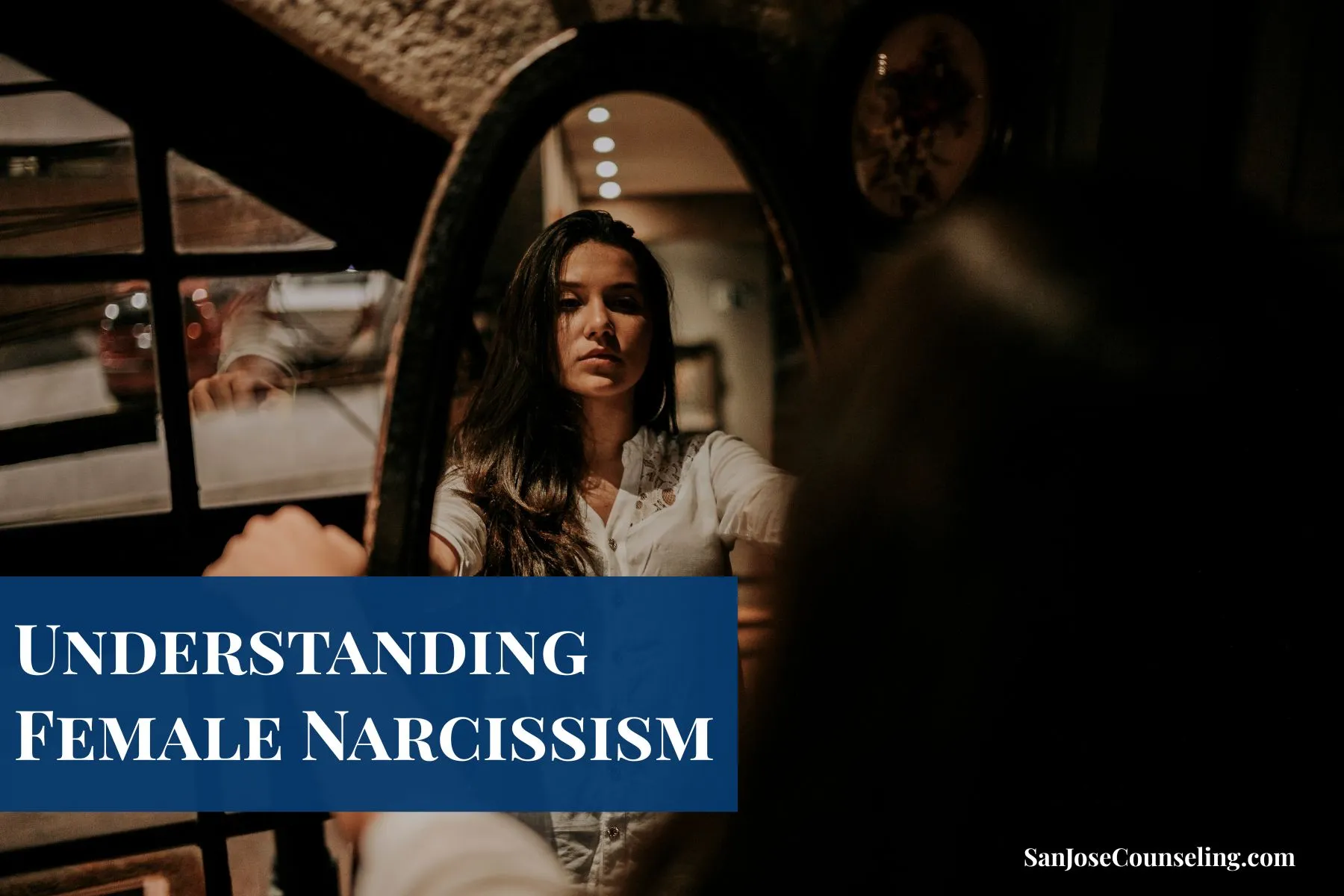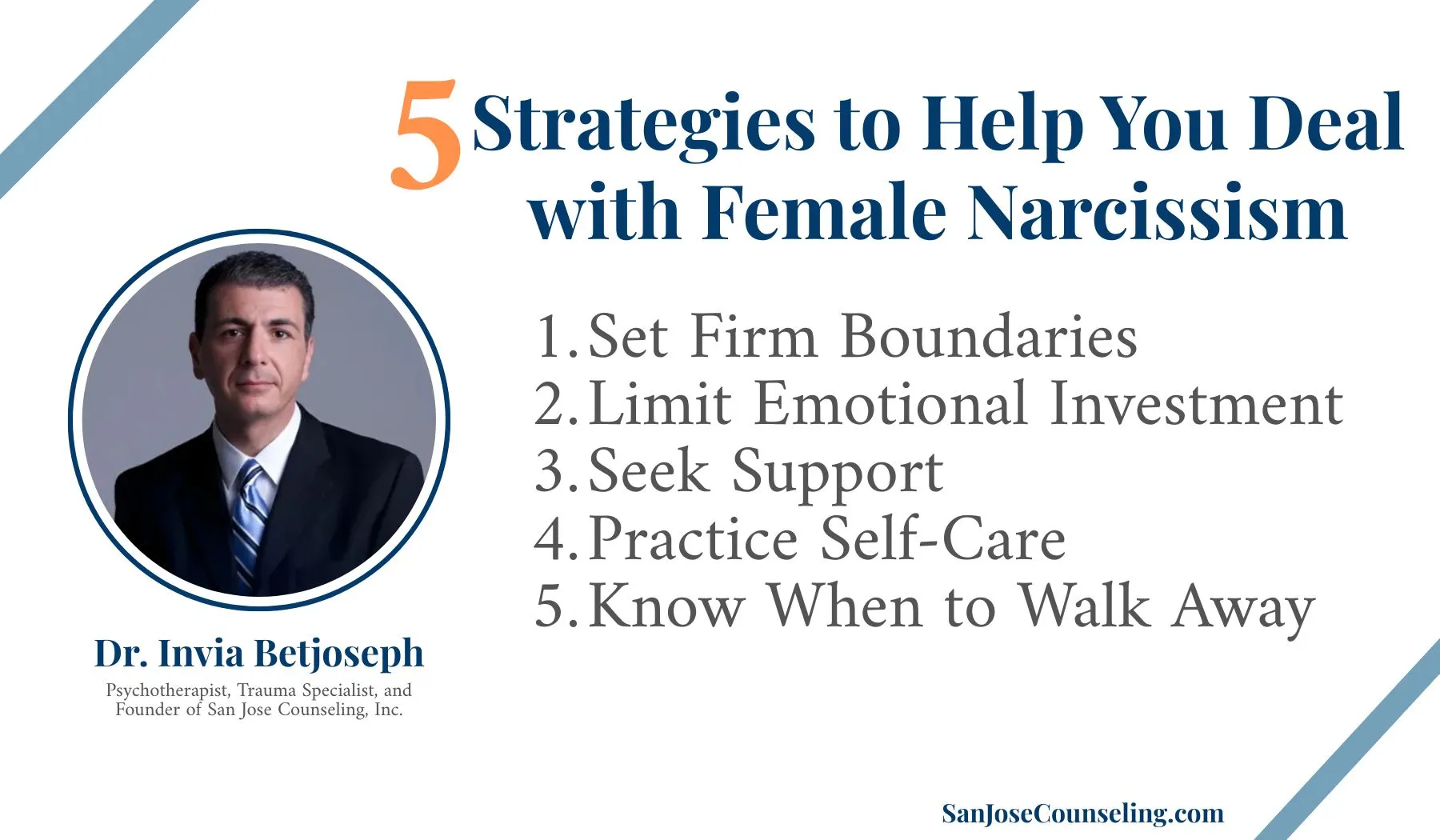Seek Therapy
408-920-1730
Traits of a Female Narcissism
Have you ever been left fatigued, confused, or disrespected by a woman in your life, but you weren’t quite sure why?
Female narcissists tend to disguise their traits, making them much more difficult to detect than male narcissists.
Studies have shown that 4.8% of women display narcissistic traits, and societal expectations like being seen as nurturing make these tendencies less obvious.
Knowing the signs of a female narcissist can help you take steps to protect your emotional health and implement appropriate boundaries.
This article will examine the seven signs of a female narcissist, alongside some examples and strategies to help you set boundaries and reclaim your peace.
Book a free consultation with Dr. Invia Licensed Marriage & Family Therapist– to take control of your peace and emotional health.
Understanding Female Narcissism: Covert vs. Overt

Narcissistic Personality Disorder (NPD) is characterized by an inflated sense of self-importance, an unrealistic need for admiration, and a significant lack of empathy.
Both men and women can have narcissism, yet women are prone to covert narcissism, which makes them all the more difficult to identify.
Covert vs. Overt Narcissism
Narcissism can appear in different ways to different people. Some people have an intense need for admiration, and they need to display sheer dominance to get it.
Some people are manipulative, and operate covertly which many people won't notice.
Here’s the difference between both types of narcissism:
Overt Narcissism: Overt narcissists are loud, egotistical, controlling, and direct in their need for admiration (voluntary or involuntary).
They will brag and degrade others, and demand that people submit to them.
Covert Narcissism: Overt narcissists might cry or pretend to be a victim, and will use passive-aggressive behaviours and more subtle actions to take charge.
They can appear charming, but their charm usually gets them to what they actually want, which is emotional control.
Women are more likely to have the traits associated with narcissism, especially covert narcissism, mainly because society expects women to be the nurturers.
Therefore, women might use guilt, emotional withdrawal, or excessive charm to control others.
The 4 D’s of Narcissism
To understand narcissistic behavior better, experts use the 4 D's of narcissism:
- Denial: Refusing to recognize faults or mistakes.
- Dismissiveness: Ignoring or shunning other people's feelings.
- Devaluation: Putting others down to improve their own ego
- Deflection: Blaming others to avoid accountability.
Realizing these are traits of narcissism can help you recognize a covert wife narcissist and be aware of their emotional manipulation.
Also you need to know when to walk away from someone with mental illness when you’re in a relationship with a narcissist female.
Comparative Analysis of Covert and Overt Narcissism
Narcissism is a range, and there are subtle differences between overt and covert narcissism.
Overt narcissism is open and direct in its praise-seeking, whereas covert narcissism is done undercover which makes it deviously difficult to follow.
Key Traits/Signs | Covert Narcissist | Overt Narcissist |
Personality | Subtle, Manipulative | Bold, Domineering |
Attention-Seeking | Indirect (Playing victim) | Direct (Demands admiration) |
Emotional Tactics | Guilt-tripping, passive-aggression | Intimidation, arrogance |
Response to Criticism | Silent treatment, sulking | Outbursts, aggression |
Control Methods | Charm, emotional withdrawal | Direct commands, dominance |
The 7 Signs of a Female Narcissist and Their Test

A female narcissist frequently displays three primary behaviors. She needs control, admiration, and then she uses emotional manipulation to achieve the first two behaviors.
Those around her frequently are emotionally drained, confused, and feel unimportant.
Below is a more detailed look at the traits of a female (wife) narcissist alongside some case studies, examples, and ways to test for this behavior.
1. She Craves Constant Admiration (But It’s Never Enough)
Being near a female narcissist usually feels draining, and regardless of how much praise you offer, it is never enough.
She’s always craving validation especially when it comes to appearances, accomplishments or social status.
For example, let's consider Emma, a social media influencer who is always looking for affirmation of her appearance. If a post with a photo of herself does not get enough likes, she begins doubting herself and demanding reassurance by fishing for compliments.
Another good example would be a woman who makes conversations about herself; any time she hears someone else's accomplishments or successes, she acknowledges them, but then quickly highlights her own.
Common Signs of This Trait:
- Frequent bragging
- Fishing for compliments
- Sulking when ignored
You can test for this narcissistic trait by observing how she reacts when you or others don’t shower her with praise or acknowledgement. Does she become irritated or manipulative?
2. She Lacks Empathy (And It Shows)
A female narcissist doesn't understand or even cares about other people's feelings and will often disguise this insensitivity as "tough love" or a busy schedule.
She may ignore feelings, never apologize, or simply put her own needs first. For example, Lisa is a manager of a small production company.
Lisa continually ignores her employees' sadness, stress or anxiety, telling them they should all "just toughen up." When a team member expresses stress, Lisa just brushes it away and changes the subject back to how she is doing.
A similar example could be a mother who doesn't understand her children's sadness, but instead, focuses on keeping her own reputation with friends and family intact.
Common Signs of This Trait:
- Dismissing emotions
- Refusing to apologize
- Prioritizing her needs over others
You can evaluate this narcissistic trait in a woman by simply talking about a personal difficulty—is she giving you thoughtful support, or does she quickly shift the focus back on herself?
3. She’s a Master Manipulator (Subtle but Damaging)
A female narcissist is excellent at changing reality to suit her ideology, which can even cause you to question your own perception.
She may resort not only to gaslighting but also to guilt and playing the victim as means of controlling the narrative and influencing others.
For example, Sarah always blames others during an argument. If you tell Sarah you were hurt by something she said, she will say, "I never said that-you must be imagining things." As this goes on, you may begin to doubt yourself or even stop trusting Sarah entirely.
Sometimes a woman might cry or express intense emotions to avoid taking responsibility. In the end, the one who was wronged ends up feeling like they're the one at fault.
Common Signs of This Trait:
- Denying events or changing the narrative
- Blaming it on someone else
- Using emotional abuse to avoid taking responsibility
You can test for this narcissist trait by calmly confronting her about confusing inconsistencies-- does she change the story or make you feel guilty for even questioning her?
4. She’s Hypersensitive to Criticism (And Holds Grudges)
A female narcissist perceives any type of critique as a personal assault, immediately becoming defensive or holding a grudge in silence. Rather than simply accepting feedback, she may lash out by being rude, bitterly resentful, or plotting revenge.
For example, if Rachel receives input from a friend on another outfit to wear, she gets upset. Instead of ignoring the comment, she pouts for a few days and eventually cancels that friend from any future plans.
Common Signs of This Trait:
- Overreacting to suggestions
- Harboring resentment
- Spreading gossip to retaliate
You can test for this narcissistic trait by simply offering neutral feedback. Does she explode in anger, sulk, or want to retaliate?
5. She’s Obsessed with Image (At Others’ Expense)
A woman narcissist is highly obsessed with her appearance, status within social circles, and reputation, and often at the expense of others. She lives for the validation she receives from other people's perceptions of her looks, accomplishments or social status. She compares herself constantly, and she will put down other women who don't fit a certain ideal.
For instance, imagine that Olivia is a woman who spends an enormous amount of time creating the perfect image for her social media. On one hand, she loves it when people compliment her on her looks, but subtly criticises her friends who don’t match her status.
Another example is a woman who name-drops an influential person for her status, but dismisses those she considers “less important.”
Common Signs of This Trait:
- Constant comparison to others
- Excessive social media curation
- Shaming others’ appearances or choices
You can test this narcissistic trait out by simply observing how the individual reacts when a person achieves any sort of recognition. Does she outshine their achievement or diminish it somehow?
6. She Exploits Relationships (With No Remorse)
A female narcissist will use others to her advantage, presumably because she's bored and wants "favors," emotional support, or status. She will liken relationships to transactions in which she gives very little and expects a continuous flow of loyalty and support.
For instance, take Sophie, who routinely borrows money from friends without ever paying them back. If someone asks her about the loan, she instantly plays the victim and makes them feel guilty for even questioning her.
Consider also, a woman who uses her friends, only keeping them around until they no longer serve her purpose, then severing ties abruptly.
Common Signs of This Trait:
- One-sided favors
- Manipulating others for personal gain
- Discarding people when they’re no longer useful
To see if she has this narcissistic characteristic, you can simply set a boundary with her. Did she guilt you, or did she just discard you as a friend when you were no longer there to meet her needs?
7. She Creates Drama (And Thrives on It)
A female narcissist builds drama, blows everything out of proportion, plays the victim to keep control. She loves chaos and keeps relationships tense and unpredictable.
For example, Mia makes drama with friends, telling them things about one another to pit them against each other. She gossips and lies, distorts conversations, and creates fights between individuals. When confronted, she acts innocent.
Common Signs of This Trait:
- Stirring conflicts unnecessarily
- Exaggerating problems for attention
- Playing the victim in disputes
You can check for this narcissistic characteristic by simply watching how much she's involved in drama. Does she always find herself in the center of conflict?
Read More: Signs Your Body is Releasing Trauma.
The Emotional Cost: How a Female Narcissist Affects You
For years, Sarah tried to please her narcissistic boss by always walking on eggshells for fear of criticism.
Eventually Sarah found herself exhausted, anxious, and feeling worthless. This is the reality for many people who deal with female narcissists—the emotional cost can be enormous.
Here are five major effects that being involved with a female narcissist may cause you:
- Anxiety & Stress – Constant manipulation and unpredictability can lead to emotional fatigue.
- Low Self-Worth – Continuous criticism and denial can make people doubt their own value.
- Trust Issues – Gaslighting and betrayal can dissolve trust in relationships.
- Emotional Exhaustion – You are likely to be mentally drained from impossibly high expectations.
- Isolation – She may try to sever your connections with friends and family to keep control.
Recognizing these effects is the first step to taking charge of your emotional health.
Dr Invia Explains 5 Strategies to Help You Deal with Female Narcissism.

Interacting with a female narcissist can be emotionally draining, but you don't have to remain stuck in toxic environments.
These five pragmatic approaches may help you safeguard your wellbeing and regain control, and these include:
1. Set Firm Boundaries
Narcissists will push boundaries, so it is vital to be specific about what you will and will not tolerate. Be direct and consistent, and do not let guilt or manipulation compromise your stance.
2. Limit Emotional Investment
A narcissist often leads you into a space of emotional frustration. In this situation, use the Gray Rock Method and be unresponsive and neutral. When you starve a narcissist's need for drama, you reclaim your peace.
3. Seek Support
Reach out to friends, trusted therapists, or support groups for a different perspective and some validation. Professional guidance from experts like Dr. Invia can help you navigate these complexities.
Schedule a free consultation call with Dr. Invia today!
4. Practice Self-Care
Spend time doing things that help encourage your confidence and add to your emotional strength: mindfulness activities, journaling, and fun hobbies that bring you happiness.
You can also try some communication strategies for couples to deepen your bond and reduce narcissistic traits.
5. Know When to Walk Away
Knowing when to cut your losses may also be the best choice for you if the relationship is doing too much damage. Recognizing when to let someone go is valuable for your mental health.
Take Control of Your Peace
Understanding the seven signs of a female covert narcissist equips you to implement boundaries, protect your emotional health with the practice of mindfulness, and take back control.
The first step to breaking free from the manipulation is to reestablish your confidence.
If you are facing a toxic relationship, consider booking a free consult with Dr. Invia A. Betjoseph – Licensed Family and CSAT (certified sex addiction therapist) therapist for expert help.
Your peace is too precious to lose — get started today.
FAQ
How do narcissists respond when confronted?
Narcissists typically will pass the blame along to someone else, deny any wrongdoing, or get irate when confronted about their behavior.
Narcissists can also gaslight you to the point of making you question shared reality or even play the victim to gain sympathy from others.
They may even withdraw from the situation and give you the silent treatment to regain control of the relationship.
What are the five main habits of a narcissist?
Narcissists have an insatiable need for admiration and constantly seek external validation from other people.
They have no empathy, discounting or disregarding the feelings of others. They manipulate to get their way, whether that be through guilt-tripping or lying.
They feel entitled to special treatment, often exploiting people for personal gain without regard for the emotional toll it has on them.


